RELATED ARTICLE
Police Story and Police Story 2: Law and Disorder
The Criterion Collection

A woman gets out of a red cab on a Hong Kong street corner. From under a massive tree, she spots a red balloon trapped in its canopy. She tries to free it by throwing a water bottle. A man sees her from across the street and joins her. His aim is even worse, so he hoists her up—but the balloon is still out of reach. They’re joined by another man, who becomes the base of a wobbly, staggering human ladder. The woman at the top is now just barely able to grasp the balloon’s string. The three lurch their way out from under the tree and, beaming smiles on their faces, let the balloon fly free into the night sky. This sequence, barely two minutes long and without a single line of dialogue, is Throw Down, and the cinema of Johnnie To, in its purest form.
When Throw Down was released in the summer of 2004, To was at the tail end of an unprecedented burst of creativity. It was the nineteenth feature film he’d either directed or codirected since founding his own production company, Milkyway Image, in 1996—plus two or three more he claims to have taken over from their nominal directors partway through production. These films constitute a remarkable expression of the variety and resilience of Hong Kong cinema in general and of the complexity of To’s art in particular. During this time, he made light comedies and heartrending melodramas (and, as with My Left Eye Sees Ghosts, both at the same time). He distilled the “heroic bloodshed” subgenre of crime film popularized by John Woo to its essence (The Mission) and blew it up to its most baroque proportions (A Hero Never Dies). He launched a series of wildly popular romantic comedies with pop stars Andy Lau and Sammi Cheng, including one that costumes them in absurdly phony fat suits (Love on a Diet). He made wild farces (Wu yen) and one of the twenty-first century’s most profound ruminations on faith (Running on Karma), which stars Lau in a squeaky rubber muscle suit.
But of all these films, To said in an interview in 2005, Throw Down was his favorite. It’s a film about three misfits: a drunken club owner and fallen judo champion trying to scam and gamble his way to enough money to pay his debts; a sprightly young singer searching for her big break into show business; and a hungry novice fighter who lives only to challenge other people and improve his skills. These characters might have made for a love triangle in a romantic comedy, or a trio of lost souls fated for tragedy in a gritty crime saga. But instead, To places them in a film about the sport of judo, paying homage to Akira Kurosawa and his debut film, the 1943 martial-arts movie Sanshiro Sugata, about a headstrong judo student’s physical and moral education. This also allows To to express his belief in the virtue of struggle and self-improvement. As he told film scholar Stephen Teo, Throw Down “is about taking a positive view of life. So positive that whatever happens to you, it doesn’t mean that you are without hope or that you will die.”


